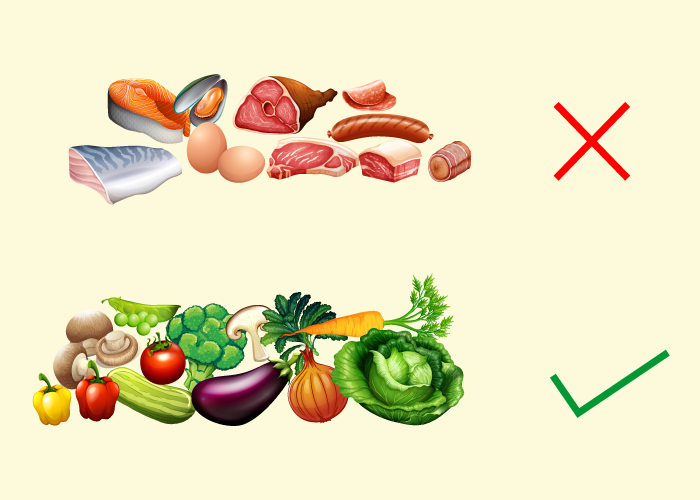
Contents
Introduction
Crohn’s disease is a chronic inflammatory bowel disease that can cause inflammation anywhere along the digestive tract. While there is no cure for Crohn’s disease, managing symptoms through lifestyle changes, including diet, can help improve the quality of life for those living with the condition. In this article, we’ll explore the best foods to eat and the foods to avoid when managing Crohn’s disease symptoms.
Foods to Eat
Maintaining a well-balanced diet is crucial for individuals with Crohn’s disease to ensure they receive adequate nutrition while managing symptoms effectively. Here are some Crohn’s-friendly foods to include in your diet:
Lean Proteins
Including lean protein sources in your diet can provide essential nutrients without exacerbating digestive symptoms. Opt for lean meats like chicken, turkey, and fish, as well as eggs and tofu for plant-based options.
Low-Fiber Fruits and Vegetables
While fruits and vegetables are typically considered healthy choices, individuals with Crohn’s disease may need to choose low-fiber options to reduce the risk of aggravating symptoms. Examples include peeled and cooked fruits, such as applesauce and bananas, and well-cooked vegetables like carrots and squash.
Whole Grains
Whole grains are an important source of fiber and nutrients, but some varieties may be difficult to digest for individuals with Crohn’s disease. Choose easily digestible grains like white rice, white bread, and refined pasta, or opt for gluten-free alternatives like quinoa and rice flour.
Healthy Fats
Incorporating healthy fats into your diet can help maintain overall health and support nutrient absorption. Choose sources of unsaturated fats such as olive oil, avocados, and nuts, while limiting saturated and trans fats found in fried foods and processed snacks.
Probiotic Foods
Probiotics are beneficial bacteria that can help maintain a healthy balance of gut flora and reduce inflammation in the digestive tract. Include probiotic-rich foods like yogurt, kefir, and fermented vegetables such as sauerkraut and kimchi in your diet to support digestive health.
Hydration
Staying hydrated is essential for individuals with Crohn’s disease, especially during flare-ups when fluid loss may be increased. Aim to drink plenty of water throughout the day, and consider incorporating electrolyte-rich beverages like coconut water or sports drinks to replenish lost nutrients.
Foods to Avoid
While certain foods can help manage Crohn’s disease symptoms, others may exacerbate inflammation and digestive discomfort. Here are some foods to avoid or limit:
High-Fiber Foods
High-fiber foods can be difficult to digest for individuals with Crohn’s disease, leading to increased gas, bloating, and abdominal pain. Avoid foods like raw fruits and vegetables, whole grains, and legumes, and opt for low-fiber alternatives instead.
Dairy Products
Dairy products may worsen symptoms for some individuals with Crohn’s disease, particularly those with lactose intolerance or dairy sensitivities. Consider limiting or avoiding dairy products like milk, cheese, and ice cream, and opt for lactose-free or dairy-free alternatives as needed.
Spicy Foods
Spicy foods can irritate the digestive tract and trigger symptoms like abdominal pain and diarrhea in individuals with Crohn’s disease. Limit or avoid spicy foods like hot peppers, chili peppers, and spicy sauces to reduce the risk of exacerbating inflammation.
High-Fat Foods
High-fat foods can slow digestion and may worsen symptoms like diarrhea and cramping in individuals with Crohn’s disease. Limit foods high in saturated and trans fats, such as fried foods, fatty cuts of meat, and processed snacks, and opt for healthier alternatives instead.
Processed Foods
Processed foods often contain additives, preservatives, and artificial ingredients that can trigger inflammation and digestive symptoms in individuals with Crohn’s disease. Choose whole, unprocessed foods whenever possible, and read labels carefully to avoid hidden sources of additives and artificial ingredients.
Conclusion
Maintaining a healthy diet is an essential aspect of managing Crohn’s disease symptoms and promoting overall well-being. By incorporating Crohn’s-friendly foods like lean proteins, low-fiber fruits and vegetables, and probiotic-rich foods into your diet, you can support digestive health and reduce inflammation in the digestive tract. Additionally, avoiding or limiting trigger foods like high-fiber foods, dairy products, and spicy foods can help minimize symptoms and improve quality of life for individuals living with Crohn’s disease.